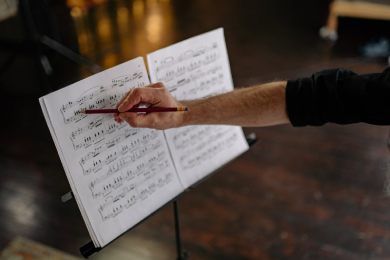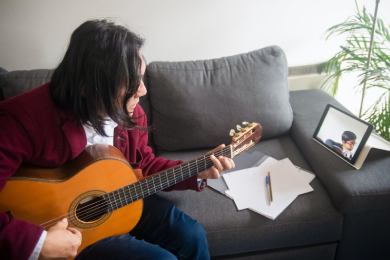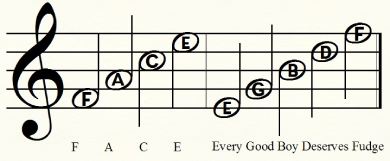Perhaps you’ve taught yourself how to play an instrument over the past few years, or maybe you’re looking to begin your musical journey. Whatever the case may be, learning music theory is an important step in becoming the best musician you can possibly be.
However, not everyone has access to a dedicated music theory teacher. For this reason, some wonder if it’s possible to learn music theory on your own.
It is possible to learn the basics of music theory on your own. You can do this through online resources or books from your local music shop. However, as you progress into more advanced concepts, it’s often best to have a teacher on your side.
Below, we will discuss more about learning music theory on your own versus learning it with the help of a teacher. Keep reading to learn how to make the best decision for your goals!
Is It Possible to Learn Music Theory On Your Own?
Yes, it is possible to learn music theory on your own. It will take self-discipline and creating a plan to follow to learn new concepts, practice, and apply what was learned.
Set goals for what you want to learn, whether that is a new scale or how to apply a scale in a song.
Learning music theory also includes analyzing and learning about parts in other musicians’ songs. There is a reason why classical music is still studied, or why jazz is broken down to understand how musical concepts have been used.
Not everyone has the time or resources to find a dedicated music theory teacher. For this reason, many people choose to learn the fundamentals of music theory on their own.
But, as you progress to more complicated subjects, it may be helpful to find a teacher who can help you strengthen your skills even more.
What Are the Fundamentals of Music Theory?
All musicians use some kind of music theory as they write their own songs, whether they realize it or not.
In music theory, there are five “fundamentals” you must learn before you can progress further. The five fundamentals of music are generally the easiest part of music theory to learn. They include:
- Pitch: how high or low a note is.
- Scale: a set of musical notes ordered by a certain pitch.
- Chords: two or more notes played at the same time.
- Rhythm: a repeated pattern of movement or sound played throughout a song.
- Melody: or the tune of a song.
In addition to the five fundamentals, the other basics of music theory are generally easy to learn on your own.

This includes reading different parts of sheet music, such as time and key signatures, as well as how to read different notes. However, as you deepen your knowledge of music theory as a whole, it may be helpful to start working with a teacher.
Why Work with a Teacher to Learn Music Theory?
After learning the fundamentals of music and gaining a basic understanding of how to read music, most people decide to work with a teacher to increase their understanding of music theory.
This is often a good way to clear up any inconsistencies and provide feedback on how you’re currently using your knowledge.
Give You Guidance
There is a lot that goes into music theory as a whole. However, not everything will be relevant to you personally or your goals.

A music theory teacher can learn more about what you’re looking to do, then give you the right information for success and collaborate on ideas and thoughts you have. Internet resources, on the other hand, typically do not consider your intent.
Answer Questions
A music theory teacher can also help you make sense of any confusing information you find and give you context on what you’re learning.
Within music theory, there are a lot of ideas you may come across that are, essentially, theoretical. In addition to this, different people often use different terms for the same concepts.
Working with a teacher ensures you always learn consistent information and never get confused.
Another Person To Talk Too
As you progress in your music theory journey, you may need to start composing your own music or even sheet music for others to perform.

While there’s no way to get constructive feedback when you learn on your own, your teacher will be able to point you in the right direction if you make any mistakes.
My Experience Learning Music Theory
I am primarily a self-taught musician, but in saying that, I did take piano lessons for a year when I was seven, I played alto saxophone for three years (grade 7-9), and took guitar lessons for two months.
Learning to play piano at a young age and having a piano in the house gave me the knowledge of learning to play an instrument, a couple of songs, and a general idea of what notes and chords were.
Learning to play an instrument in a band gave me the ability to read sheet music, and understand how instruments work together, and tempo!

When I took guitar lessons years ago I did so for two months (I would have gone longer, but it was quite the drive and I didn’t have a license yet!). In those two months, I learned more than I did in the two years prior to learning on my own.
Even though there were many fewer online resources then, I told the teaches what I wanted to learn and he customized his lessons and gave me a lot of resources directly related to what I wanted to learn.
Since then I made friends with other musicians that would teach me theory just through jamming or talking.
With all that said, can you learn music theory on your own?
Final Thoughts
Learning music theory is an essential part of your journey to becoming the best musician possible.
While it’s relatively easy to learn the fundamentals of music theory and other basic concepts on your own, it’s often best to find a teacher as you move into more advanced concepts.
A teacher will be able to clear up any confusion, point you in the right direction if you make any mistakes, and give you the most relevant information to your goals. After a certain point, working with a teacher is generally the best decision, even if it’s just for a short time.


1 thought on “Can You Learn Music Theory On Your Own?”
Comments are closed.